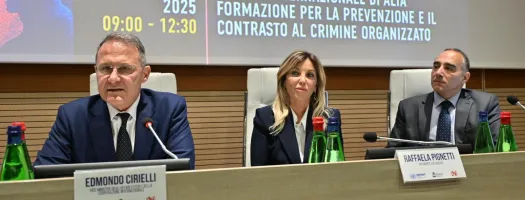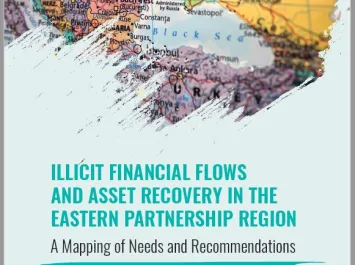Promoting employment and social inclusion, preventing marginalisation and reducing recidivism are key elements for the sustainable development of local communities. These were the central themes of the conference “Culture of legality and public-private partnership for the social inclusion of people in prison: the province of Caserta as a new model of international development”, held today at the International Training Centre for Crime Prevention in Caserta.
The event provided an opportunity to present the details of a pilot project launched by the United Nations Interregional Crime and Justice Research Institute (UNICRI) in collaboration with ASI Caserta. The initiative, aimed at strengthening the resilience of the territory, is inspired by the model developed by the Industrial Development Consortium of the Province of Caserta for the reintegration of prisoners through community service. The programme has shown strong potential in preventing recidivism by promoting social inclusion and work-based reintegration. Building on this experience, UNICRI has developed a theoretical model that identifies the ideal characteristics of an effective system for preventing recidivism through the social reintegration of people in prison. Following the research and development phase, the next steps will include the design of operational and training tools, and the model’s international application.
“Reducing recidivism is not only a goal of penitentiary policy but a broader social imperative,” said Leif Villadsen, UNICRI’s Acting Director. “To achieve this, good legislation, an effective penitentiary administration, and well-trained personnel are essential- but they are not sufficient. Reintegration must be rooted in the territory, supported by society, and grounded in the culture of labour. This is where the role of the private sector becomes decisive - both as a driver of social values and as a strategic partner in rehabilitation. Public-private partnerships offer a concrete and promising model to prevent reoffending. They allow individuals in conflict with the law to access employment, develop skills, and reintegrate into their communities with dignity and purpose. These partnerships also benefit society as a whole, by promoting safety, economic inclusion, and social cohesion.”
The implementation of the socio-occupational inclusion model for prisoners developed by the Consortium, together with the project carried out with UNICRI, can generate benefits not only in terms of reducing recidivism but also for the development of the local entrepreneurial fabric,” said ASI President Raffaela Pignetti. “In a region too often described only through the lens of its challenges, these initiatives began as bold experiments. Today they stand as tangible examples of positive outcomes - a model of cooperation that speaks to the world, because it brings together legality, inclusion and development. Reintegration of an individual in prison is an act of justice. Diverting someone from crime is an act of development. There can be no true growth if we allow entire communities to remain hostage to criminality.”
Nicola Gratteri, Chief Prosecutor at the Court of Naples, stated during his speech: “I believe in this project and I think it is useful. Only those who do nothing avoid making mistakes, so let’s try to move forward with initiatives like this. What matters is to act with honesty and in good faith.”
According to Sebastiano Ardita, Deputy Prosecutor at the Court of Catania, referring to international practices and best models adds value to the strengthening of prison systems in all countries.
Lina Di Domenico, Acting Head of the Department of Penitentiary Administration (DAP) of the Ministry of Justice, conveyed greetings on behalf of Minister Carlo Nordio and emphasised that “in recent years, agreements with ASI Caserta have been developed, renewed and expanded. These will make it possible to transfer the experience gained in this project also at the international level, with the support of UNICRI.”
During his remarks, Edmondo Cirielli, Deputy Minister of Foreign Affairs and International Cooperation, stated: “In Italy, thanks to our law enforcement, justice system, we are seen as an example of good practices. This project is proof of that.”
The conference also showcased examples of public-private partnerships in the context of successful programmes launched by the Ministry of Justice together with TIM, Lendlease and ItaliaCamp.
The event, held under the patronage of the Ministry of Justice, brought together representatives from institutions, academia, and the private sector, including: Lucia Volpe, Prefect of the Province of Caserta; Domenico Forte, Director of the International Training Centre for Crime Prevention; UNICRI experts Marco Musumeci and Vincenzo Lo Cascio; Massimiliano Molese, member of the project’s Scientific Committee; Michele Papa, University of Campania Luigi Vanvitelli; Donatella Rotundo, Director of the Santa Maria Capua Vetere Prison; Andrea Grassi, Chief of Police of the Province of Caserta; Marco Puglia, Supervisory Judge; Fabrizio Sammarco, CEO of ItaliaCamp; Nadia Boschi of Lendlease; Sabina Strazzullo of TIM; and Maurizio Vallone, Director of the Advanced Training School for Police Forces.



